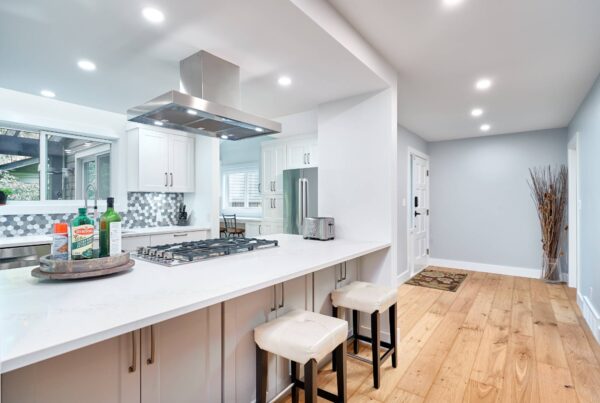So, you’re diving into a home renovation. You’ve picked your tile, envisioned your dream kitchen, and started calling contractors. But amidst the paint swatches and Pinterest boards, a serious question looms—is it built to code? It’s easy to overlook until an inspector shows up or you try to sell your home. Whether you’re updating a character house or building from the studs, understanding what lies behind the drywall is more important than ever.
Essential Permit Checks During North Vancouver Home Renovations
Before knocking down walls or reimagining your living space, take a moment to check if your plans need official approval. Many people assume that smaller projects can bypass the paperwork, but even minor changes might require permits depending on their scope. Kitchens, bathrooms, and decks all have hidden structural, plumbing, and electrical elements that trigger review by city officials.
It’s not just about having paperwork—it’s about aligning your project with city expectations before the work begins. In North Vancouver, the guidelines can change based on your lot type, zoning, or even your home’s age. Miss one early permit check, and your entire timeline could shift. Contractors worth their salt always start with this step to avoid costly do-overs later.
Ensuring Renovations Pass Rigorous Vancouver City Inspections
Every city wants to make sure new work on a home is safe and stable, and Vancouver is no exception. After permits are issued and construction starts, inspections follow. These aren’t casual glances—they’re thorough evaluations done in stages, checking everything from framing to final finishes. It’s not just a final thumbs-up; you’ll likely go through several rounds before getting the green light.
To pass these inspections, your contractor needs to build by the book. City inspectors will examine the work closely, and any shortcuts or non-compliant materials will be flagged. Good contractors prepare for these checks and understand the flow of city requirements. That experience keeps projects moving forward and reduces headaches for homeowners.
Commonly Overlooked Elements in Home Building Codes
Many people assume that as long as their renovation looks good, it’s good enough. Unfortunately, building codes care more about what’s under the surface than what’s on it. Things like fire-rated drywall, ventilation systems, and stair railing spacing often get missed because they don’t affect the day-to-day look of a room. But missing even one can halt progress in its tracks.
Another one that slips through the cracks? Window egress in bedrooms. For a basement to count as a legal bedroom, the window needs to be large enough for someone to escape during an emergency. It sounds small, but it’s the kind of detail that can stop a project cold if overlooked. Knowing these lesser-known requirements saves money and stress down the road.
Key Permit Requirements for Structural Renovations in Vancouver
Changing your home’s structure—whether opening up a wall or building an addition—requires more than enthusiasm. You’ll need clear architectural drawings, engineering assessments, and approval from the city. Permits for these types of renovations come with layers of oversight because they can impact your home’s stability and your neighbors’ safety.
In Vancouver, if you’re removing load-bearing walls or shifting foundation walls, you’ll need stamped drawings from a licensed professional. It’s not a step you can skip. The city checks these elements carefully to make sure your home remains safe in the long run. Proper paperwork up front means fewer surprises once the real work begins.
Pre-Inspection Tips for Smooth Home Renovations Compliance
If you’re nearing your inspection day, preparation is your best friend. Inspectors don’t just want to see finished work—they want to understand how you got there. Leaving key components visible, like open framing or accessible wiring, helps them do their job and speeds up approval. Covering things too early is a common mistake and often leads to delays or mandatory tear-downs.
Another tip? Keep a copy of your approved plans on site. If an inspector shows up with questions, you’ll need to show your work aligns with what was permitted. Organized paperwork and clear site access go a long way. It’s a good idea to walk through the site with a contractor beforehand to make sure everything’s ready for review.
Vital Code Standards for Electrical Upgrades in North Vancouver
Electrical work feels like a behind-the-scenes upgrade, but it’s a big player in home inspections. Even something as simple as moving an outlet can fall under strict safety rules. If you’re upgrading panels, installing new circuits, or adding lighting, an electrician needs to follow detailed code standards. These include wire gauge, breaker compatibility, and even outlet placement.
In North Vancouver, local inspectors pay close attention to electrical work because errors can lead to fire risks. Passing inspection here often involves multiple checks, especially for major renovations. Having a certified electrician who understands local rules makes all the difference. It’s not just about functionality—it’s about protecting your family and investment.
Navigating North Vancouver’s Zoning and Renovation Regulations Clearly
Zoning laws might sound intimidating, but they’re key to knowing what you can and can’t do. These rules determine how high you can build, how much yard you need to leave untouched, and even whether you can add a suite. Many homeowners don’t realize their dream project might clash with zoning boundaries or property line setbacks.
In North Vancouver, zoning can vary street by street. Before finalizing any home renovations, you or your contractor should pull your zoning report and verify what’s allowed. Making adjustments early in the planning phase keeps the project legal and avoids last-minute redesigns. It’s better to get the facts up front than find out mid-way that your plan won’t fly.
Home Inspection Essentials Before Finalizing Your Renovation Project
The final step of any major renovation is often a formal home inspection. This isn’t just a check-the-box moment—it’s a full evaluation to confirm that all elements meet safety, structural, and code standards. Inspectors will walk through your home, test systems, and ensure the permitted work was executed as planned.
To prepare, double-check that everything is finished, accessible, and functioning. Missing vent covers, loose stair rails, or half-installed switches can stall your final approval. It’s helpful to do a mock inspection with a contractor beforehand to catch small issues before the official visit. Finishing strong matters, especially if you plan to rent, refinance, or sell.
Get Ready to Renovate with Lower Coast Building Group That Delivers Code-Compliant Work With Craftsmanship You Can Trust
Your dream space doesn’t need to become a regulatory nightmare. Lower Coast Building Group brings experience, transparency, and craftsmanship to every project. From framing to finishes, our team ensures your renovation meets every standard—without compromising on design. Whether you’re opening up a space or building something brand new, we know how to make it look great and pass inspection.
No more guessing if your home is built to code. Lower Coast Building Group works directly with city officials, manages permit applications, and prepares every phase for inspection. Our attention to detail keeps your project on track and avoids costly redos. Contact us today to get started with a consultation and build your next project the right way from day one.












